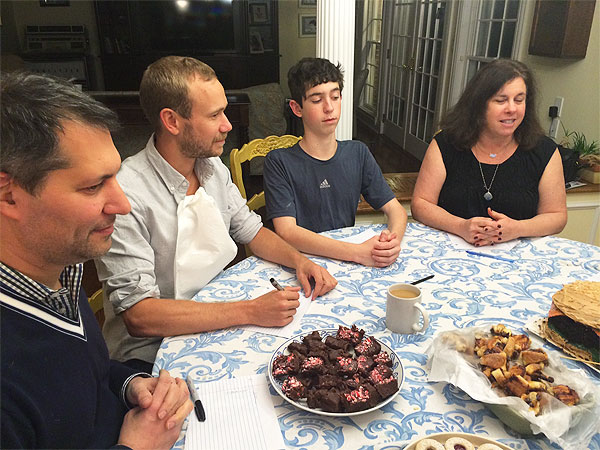UPDATED BELOW:
My daughter, Hailey, has been in Girl Scouts for years. I was never a big fan of Girl Scouts but I am a giant supporter of my kid and if she likes Girl Scouts then we will be at every damn meeting while I huddle in the corner of the room, smiling at the other mothers while unsuccessfully pretending my social anxiety disorder isn’t completely obvious to everyone.
And, for the most part, it’s quite lovely. Except for twice. One of those things I’m still working on and will write about soon because I can’t do it without screaming a lot. The other can’t wait because girl scout cookies go on sale tomorrow and I have serious reservations.
I contacted the CEO who told me to email the social media team, but so far I have no good answers so I’m just going to put this letter on my blog and maybe it will cause someone in head office to say, “This lady is 18 kinds of wrong. Let’s straighten her out right now, and make sure that we answer people when they badger us because they might be psychopaths with blogs.” Or maybe it will cause someone in the head office to say, “YES. YOU ARE EXACTLY RIGHT AND WE CAN DO BETTER.” Or maybe they’ll say, “Your daughter is kicked out of Girl Scouts. Good luck starting your own club, loser.” And that would be unfortunate but I’ve promised Hailey that if it does happen I will help her create the “What-If-Doctor-Who-Went-To-Night-Vale-and-then-the-Zombie-Apocolypse-Happened Prep Club” and she was mollified.
Now, enough preamble…here’s the letter:
Hi there. My name is Jenny Lawson and I’m having some issues I can’t seem to get answers to.
My daughter is 10 and has loved Girl Scouts for years but there are a few issues we have concerning cookie sales and I’ve been unable to get a straight answer from anyone I’ve contacted. Two issues:
1. I’ve read on the Girl Scouts website that the current pension deficit issue will cause most local councils to see a 40% increase in pension expenses starting the day girl scout cookies go on sale, and a 62% increase over the next three years. According to the girl scout.org site “For many Girl Scout councils, this means that the pension expense will suck up money that would normally go toward operating expenses such as staff salaries and benefits, camp maintenance, outreach programs for at-risk girls, scholarship support for low-income girls, and general programming.”
I know you’re currently trying to get congress to grant legislation to help you but I haven’t heard of any progress on that, so I’m under the impression that as it stands, cookie sales that previously went to scholarships and camp maintenance will now be used to pay pension debt. I’m reading of many historic camps that are being closed or sold. It’s a concern for many reasons, but particularly because the girls in our troop were always able to say that cookie sales help at-risk girls and support community camps. We haven’t been able to get any verbiage to respond to people who will ask why girl scout camps are being sold and whether the councils will be able to support scholarships as they have in the past.
2. The digital cookie sales that will allow girl scouts to sell online starting this year: From what I’ve read online, if my daughter sells a box of cookies to her nana online, her nana will be charged $4 for the cookies and $11.25 for shipping. So of the $15+ sale for one box of cookies my daughters troop will see about 60 cents. Is that right? Was that the most competitive shipping price available? Were there other bids?
Also, I’ve heard there is a handling fee of $1.25 if you pay online but have the girl scout deliver the cookies to you. Why is that, when the girls offer free personal delivery when ordering in person? (I’ve also seen it called a “credit card fee” for girl scout delivery, but that number seems incredibly high if it’s a processing fee, and credit card surcharge fees are illegal in our state.) Does the girl scout troop get the delivery fee? Do people who buy boxes online but donate them to the official Girl Scout charity have to pay those fees as well?
I hate to be nit-picky but it seems like an extremely questionable business model and my daughter has been taught by the Girl Scouts to ask questions when you think something is wrong, and to make good financial decisions, so that’s why we’re asking you for a real response so we can make a decision on whether her time is best spent selling cookies, or doing something with a greater return to her community.
Hailey is currently working toward her Bronze Award, focusing on the Girl Scouts Journey which concentrates on stopping harmful gender stereotypes, and one of the inequities we’ve discussed ourselves is that, on average, women often accept and are paid less than their male counterparts. We looked at the breakdowns and agreed that this years cookie sales program undervalues her contribution, but we also thought it was important to voice our concerns, to work hard to make sure we understood the reasoning and facts, and to try to make this organization a stronger one by asking the hard questions. I hope that you’ll be able to answer us before cookies go on sale.
As always, good luck.
~ Jenny Lawson
UPDATED (day 2): First off, HAPPY NEW YEAR! Secondly, thanks for the great feedback. It’s both relieving and disconcerting to see that so many of us have the same concerns, but I think that’s a really helpful thing for the Girl Scouts to know. The good news is that last night the Girl Scouts twitter account said they’d touch base with us after the holidays, and this morning the CEO (Anna M. Chávez) DMed me to say they’d follow up with us tomorrow. Hopefully they’ll have a good response explaining the details, or expounding on how they plan to improve in either deed, transparency or communications. It’s not ideal, but it’s a step in a good direction and hopefully one that will make the organization stronger.
Also, Hailey has decided to pass on the online sales thing this year, but my sweet daughter will probably be one of those excited young girl scouts manning a cookie booth outside a grocery story because she loves being an extrovert (I suspect she was switched at birth) so please keep in mind that the little girls asking for sales are not privy to -or responsible for- all of these complicated issues and should never be yelled at for their excitement. It’s fine to say “Sure, I love Do-Si-Dos” or “No, thanks” but yelling at small children isn’t really kosher. I know I probably don’t have to say this out loud for any regular reader with common sense, but just in case this gets to someone who isn’t a regular, please remember that children are children and are affected by your interactions.
If you’ve read my book you’ll know that already because my dedication page reads:

In other words, that shit sticks, so be nice to small children. That’s just basic human decency.
I’ll keep you posted on what I hear. Also, Hailey was extremely excited to hear how many of you were interested in the Doctor Who/Zombie/Night Vale Club. She’s designing a logo right now. No dues. Requirements: Be kind to one another. And always carry a towel. (We just finished The HitchHikers Guide to the Galaxy. ‘Nuff said.)
PS. Some of you are saying that the shipping is for a case at a time and that you can’t order less than 6 boxes at a time, but I just checked it myself and was able to place an order for one box of cookies. It was $11.25 shipping. Also, it looks like if you choose to have your local girl scout deliver it or if you donate the cookies to the USO you’ll be paying a “handling fee” for online orders.
Here’s the breakdown:

Click image to embiggen.
UPDATED (Day 3): So, I don’t know what to tell you. I was told the Girl Scouts would follow up with us today, but when I sent a tweet reminding them that we were promised a response, the Girl Scouts twitter account (very sweetly) said their Chief Digital Cookie Lead had sent me an email this morning. I searched everywhere but turns out she sent an email to some random woman whose email is nothing like mine. I asked their twitter person to just forward it to my email but they said the Digital Cookie Lead would have to do that and “she’s out of the office on holiday but should follow up soon.”
My response to them:
“I appreciate the thought. Honestly though, I’m so disappointed. Hundreds of people who are involved in Girl Scouts are on my blog asking for answers and no one representing the Girl Scouts has responded to any of our concerns, and more keep arising.
At this point I have to assume that the lack of a good answer is our answer and that’s very disheartening.
Also, I realize you personally are not the entire Girl Scout Organization and your hands are probably tied yourself, but if you have the ability to pass this up to someone who will listen it would be nice to know that these concerns are at least known. Responsive and effective communications, transparency, and dialogue are so important.
Also, as a suggestion: Perhaps next year the online sales program should not be launched on the same week that the Digital Cookie Lead responsible for it is off on holiday.
I wish you good luck and I hope that these issues can be resolved in the future. I know you’ll agree that our girls deserve that.”
If any real response ever comes I’ll pass it on here. Until then I’ll be buying Thin Mints because I like the cookies and love to see happy kids giddy over making a sale, but not necessarily because I think its a good investment in the girls.
UPDATED (Day 5): Just got an email from the Girl Scout Social Media team. It answers a few questions very well, is vague on others, ignores some altogether, and a few of the answers seem questionable, but frankly I’m just happy to see that someone is paying attention and responding. I’ve also invited them to come here to respond to your questions. Thanks for hanging in there, you guys. And thanks for pushing for answers. At least a few of them are here, and that feels like a small victory for all of us. :
Response from the Girl Scouts Social Media Account (January 5th):
Dear Jenny,
Thanks for reaching out to express your concerns and apologies in the delay in repsonse over the holiday.
As you know, the Girl Scout mission is to build girls of courage, confidence, and character, who make the world a better place. It is a shared goal of our movement to maximize the dollars available to serve girls.
Girl Scouts of the USA (GSUSA) made great effort over the past year working nationally with councils on two separate relief efforts to ease the financial burden stemming from the liability in the National Girl Scout Council Retirement Plan.
In April 2014, we were able to announce that GSUSA had officially signed an agreement with the IRS as fiduciary of the Council Pension Plan to extend the amortization period by more than four years. President Obama also signed into law H.R. 4275, a relief package unanimously passed by Congress that will smooth out council contributions over the next three years by allowing council pension plans to go back under the Pension Protection Act. Girl Scout councils and supporters nationwide united to contact over 100 Congressional offices, and wrote over 1,000 letters. The legislative support for the movement is truly historic—in fact, only 0.3 percent of Senate bills (three other bills) had such a high level of support. In addition to relief efforts, GSUSA included $1M in its Fiscal Year 2015 budget for pension assistance to councils participating in the National Girl Scout Council Retirement Plan.
To share a bit about our movement’s structure, each of the 112 Girl Scout councils have their own nonprofit status, budgets, operating models, camps, programmatic offerings, and cookie selling periods. Financial decisions such as whether or not to sell or close a camp based on usage, costs, and other camp property, are made by each local council.
The Girl Scout Cookie Program has been providing girls with educational and confidence-building experiences since the first recorded cookie sale in 1917. In keeping with tradition, the revenue from cookie sales will continue to benefit individual girl scouts. While a council may at times tap cookie money for core expenses like programming or staffing, the primary beneficiary is the girls, who decide how to spend their troop cookie money to reinvest in their communities and to have new learning experiences.
As Digital Cookie is a brand new initiative, we can understand that people need to become more familiar with the ins and outs. Shipping costs are in line with established industry standards from reputable companies, and comparable to what customers would pay to ship cookies. With time, we hope that the scale of sales through this part of the program will drive down the costs of shipping and handling.
We would like to assure you that Girl Scouts is committed to bringing girls a dynamic, exciting, and, most of all, FUN Girl Scout experience—one they cannot get anywhere else.
Thanks again for seeking clarification. We’re working to update our website and hope this note has addressed your concerns. Best wishes to your daughter, we hope she has a ah-mazing year with her troop!
And so there we are. What have we learned? We learned that the pension issue could have been answered a month ago when our troop first sent letters asking what it meant and then I wouldn’t have written this post in the first place. But I did, and it was good because looking at the comments you can see real issues…some that we can change and others that we can’t. We know that often the issues we think we struggle with alone are actually far-reaching, and are worthy of addressing. We’ve learned that a large corporation cannot be all things to all people, and that the success of your troop depends almost entirely on the skills and choices of your specific troop, leaders, volunteers and local council. We’ve learned that no one really knows entirely what is going on. (I suspect we already knew that.)
But the thing I learned the most through all of this is that the woman who started the girl scouts was a bad-ass who looked like she would kill you and eat you if you messed with her or her girls.

There wasn’t a commercial cookie program when she was around (aside from sporadic bake sales of homemade cookies) and I suspect if she was around now she’d be asking a lot of these same questions, and pointing to her 1917 quote on the importance of “Thriftiness” being taught to girl scouts:
“The most valuable thing we have in this life is time, and most girls are apt to be rather stupid about getting the most out of it….Money is a very useful thing to have.” ~ Juliette Gordon Low
Of course, this was a woman who found out that her dead husband willed all of his money to his mistress and she was like, “Aw, HELL NO. LAWYER UP, Y’ALL, BECAUSE THIS BULLSHIT WILL NOT STAND.” (I’m paraphrasing. BTW…she won that half million dollar lawsuit, against the advice of friends who advised her to not make waves.)
But there’s another quote from her that probably fits better here, even though it’s a bit poignant for this sort of irreverent blog.
Juliette Gordon Low on Girl Scouting:
“I realize that each year it has changed and grown until I know that,
a decade from now, what I might say of it would seem like an echo of
what has been instead of what is.
The work of today is the history of tomorrow, and we are its makers.”
This might not be what Juliette had in mind when she starting Girl Scouts, but I’d like to think that our work today to ask the hard questions and fight the good fight would have earned a small nod from her. And possibly a raised eyebrow at all the cursing.
Probably both.



 For this recipe I used brown lentils because they cook quickly and hold their shape. Brown lentils cook in about 20 minutes, whereas French or green lentils take closer to 45 minutes. Red and yellow lentils also cook quickly, but they tend to break down and turn into mush when cooked. I definitely wanted the lentils to stay whole.
For this recipe I used brown lentils because they cook quickly and hold their shape. Brown lentils cook in about 20 minutes, whereas French or green lentils take closer to 45 minutes. Red and yellow lentils also cook quickly, but they tend to break down and turn into mush when cooked. I definitely wanted the lentils to stay whole. To cook the lentils, bring a pot with about 3 cups of water to a boil (the amount of water isn’t so crucial, just as long as there is enough for the lentils to move about freely, kind of like when cooking pasta. It will be drained off later). Once boiling, add 1 cup of dry lentils. Let the pot come back up to a boil, then turn the heat down to low, place a lid on top, and let it simmer for about 20 minutes. After 20 minutes, test a lentil to see if it’s tender. If not, let it simmer for about 5 more minutes. Drain the lentils in colander once finished cooking.
To cook the lentils, bring a pot with about 3 cups of water to a boil (the amount of water isn’t so crucial, just as long as there is enough for the lentils to move about freely, kind of like when cooking pasta. It will be drained off later). Once boiling, add 1 cup of dry lentils. Let the pot come back up to a boil, then turn the heat down to low, place a lid on top, and let it simmer for about 20 minutes. After 20 minutes, test a lentil to see if it’s tender. If not, let it simmer for about 5 more minutes. Drain the lentils in colander once finished cooking. Meanwhile, prep and cook the vegetables. Mince two cloves of garlic and finely dice one medium onion and three medium carrots (about 1/2 lb.).
Meanwhile, prep and cook the vegetables. Mince two cloves of garlic and finely dice one medium onion and three medium carrots (about 1/2 lb.). Add the garlic, onions, and carrots to a large skillet along with one tablespoon of olive oil. Sauté over medium heat until the onions become transparent, about 5 minutes.
Add the garlic, onions, and carrots to a large skillet along with one tablespoon of olive oil. Sauté over medium heat until the onions become transparent, about 5 minutes. Add two tablespoons of curry powder and sauté for one minute more (this toasts the spices and helps bring out their flavor). All curry powders are a little different, so you can start with one tablespoon and increase it to your liking.
Add two tablespoons of curry powder and sauté for one minute more (this toasts the spices and helps bring out their flavor). All curry powders are a little different, so you can start with one tablespoon and increase it to your liking.  Add the cooked and drained lentils, plus one 15oz. can of tomato sauce. Stir to combine and then heat through (about five minutes). Taste the lentils and add salt if needed. I added about 1/2 teaspoon.
Add the cooked and drained lentils, plus one 15oz. can of tomato sauce. Stir to combine and then heat through (about five minutes). Taste the lentils and add salt if needed. I added about 1/2 teaspoon. Serve them hot topped with fresh cilantro (if you’re a cilantro person).
Serve them hot topped with fresh cilantro (if you’re a cilantro person).  There are a lot of different ways you can eat these Curried Lentils, this yummy bowl being one of them. I added a bed of brown jasmine rice, the lentils, a fried egg, and some fresh cilantro. SO GOOD.
There are a lot of different ways you can eat these Curried Lentils, this yummy bowl being one of them. I added a bed of brown jasmine rice, the lentils, a fried egg, and some fresh cilantro. SO GOOD. 




 I would like to salute the women who created dinosaur erotica this year. Most of the very short e-books are about cave-women-type people who engage in various sex acts with dinosaurs. Not because they have dinosaur fetishes (at least not that they know of, at first! ahhhh I love it), but because they get caught in unexpected hunting situations, etc. (putting aside that people and dinosaurs didn't live at the same time. PROBABLY). For instance, the opening of
I would like to salute the women who created dinosaur erotica this year. Most of the very short e-books are about cave-women-type people who engage in various sex acts with dinosaurs. Not because they have dinosaur fetishes (at least not that they know of, at first! ahhhh I love it), but because they get caught in unexpected hunting situations, etc. (putting aside that people and dinosaurs didn't live at the same time. PROBABLY). For instance, the opening of 


































 Nancy Silberkleit is, by trade, an elementary school art teacher. She worked with kids in New Jersey, helped set up art education programs in schools and group homes and, according to her official biography, "was instrumental in launching the Hudson Valley Children's Museum, located in Nyack, New York." Additionally—in the parlance of those of us who have taken art classes—she emitted hella art teacher vibes. Silberkleit had long grey hair, glasses, with the air of having been a hippie at one point. Most prominently, her demeanor was kind, engendered trust; she spoke patiently and deliberately.
Nancy Silberkleit is, by trade, an elementary school art teacher. She worked with kids in New Jersey, helped set up art education programs in schools and group homes and, according to her official biography, "was instrumental in launching the Hudson Valley Children's Museum, located in Nyack, New York." Additionally—in the parlance of those of us who have taken art classes—she emitted hella art teacher vibes. Silberkleit had long grey hair, glasses, with the air of having been a hippie at one point. Most prominently, her demeanor was kind, engendered trust; she spoke patiently and deliberately.![[Image: an animated gif of David Tennant as the Doctor, making an unappreciative face at some interior decor]](https://captainawkwarddotcom.files.wordpress.com/2014/12/tumblr_mw0lvqghvg1qicthao1_500.gif?w=300&h=169)
![[image: a comparison photograph showing a Mayan stepped pyramid next to an Egyptian sloped pyramid.]](https://captainawkwarddotcom.files.wordpress.com/2014/12/pyramids.jpg?w=300&h=210)
![[image: a lovely little rageasaurus holding its leash in its mouth and begging for a walk.]](https://captainawkwarddotcom.files.wordpress.com/2014/12/little-ragey.png?w=278&h=300)
![[image: an animated gif of cheese-rolling activities. People are throwing themselves down a cliff.]](https://captainawkwarddotcom.files.wordpress.com/2014/12/ffel31q.gif?w=300&h=216)

![[image: a Tibetan fox slinking away, looking really suspicious]](https://captainawkwarddotcom.files.wordpress.com/2014/12/gif-suspicious.gif?w=300&h=168)











 “Rules for Wearing ‘Challenging’ Clothing Items, Ankle Boots Specifically”
“Rules for Wearing ‘Challenging’ Clothing Items, Ankle Boots Specifically”




 Unfortunately, they’re system is not foolproof because, truth be told, I should have won this year. There, I said it. These cookies sticks score high on originality, presentation, and overall taste. Crunchy cookie coated in chocolate, almonds, and sea salt. AND, then I did a second version with dark mint chocolate drizzle that was said to give Pepperidge Farm’s Mint Milano cookie a serious run for its money. This should have been my year. Not letting it go…
Unfortunately, they’re system is not foolproof because, truth be told, I should have won this year. There, I said it. These cookies sticks score high on originality, presentation, and overall taste. Crunchy cookie coated in chocolate, almonds, and sea salt. AND, then I did a second version with dark mint chocolate drizzle that was said to give Pepperidge Farm’s Mint Milano cookie a serious run for its money. This should have been my year. Not letting it go… The chocolate chips are simply melted using a double boil method. Use a double boil pot or improvise again by placing a heat safe bowl in a pot of simmering water like seen here…
The chocolate chips are simply melted using a double boil method. Use a double boil pot or improvise again by placing a heat safe bowl in a pot of simmering water like seen here…  Once the chocolate is nice and melty, you can transfer it to a jar that’ll be the right depth for dipping your cookie into. Test the jar before transferring over the chocolate…
Once the chocolate is nice and melty, you can transfer it to a jar that’ll be the right depth for dipping your cookie into. Test the jar before transferring over the chocolate… Then start dipping! Let any excess chocolate run back into the jar and lay cookie on the parchment to set.
Then start dipping! Let any excess chocolate run back into the jar and lay cookie on the parchment to set.  You’ll need to add the chopped almonds and sea salt to the chocolate-covered cookie stick before the chocolate dries. I recommend doing it immediately after each cookie is dipped.
You’ll need to add the chopped almonds and sea salt to the chocolate-covered cookie stick before the chocolate dries. I recommend doing it immediately after each cookie is dipped.  The steps are the same for the mint-chocolate drizzle variety, except for that you’ll need to add the peppermint oil (do not use extract, it must be peppermint oil) to the chocolate during the melting stage. Stir it in evenly and add peppermint to taste. I like it really pepperminty, but some prefer less.
The steps are the same for the mint-chocolate drizzle variety, except for that you’ll need to add the peppermint oil (do not use extract, it must be peppermint oil) to the chocolate during the melting stage. Stir it in evenly and add peppermint to taste. I like it really pepperminty, but some prefer less.  I used a fork for the drizzling. Have fun with it. Go as heavy or light as you want…you can’t really mess it up.
I used a fork for the drizzling. Have fun with it. Go as heavy or light as you want…you can’t really mess it up.  Let them dry for about 2 hours before serving or moving around. You want that chocolate to really harden into a nice shell over the cookie.
Let them dry for about 2 hours before serving or moving around. You want that chocolate to really harden into a nice shell over the cookie.  Once the chocolate has hardened, you can gently snap off any excess chocolate drizzle that might be popping off the sides of the cookie stick.
Once the chocolate has hardened, you can gently snap off any excess chocolate drizzle that might be popping off the sides of the cookie stick. 





